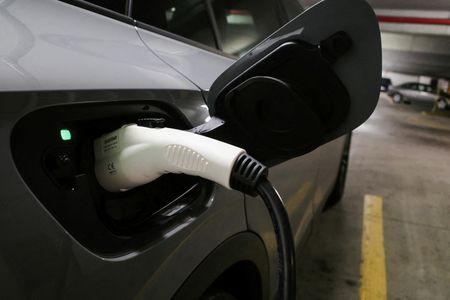By David Shepardson
WASHINGTON (Reuters) – The first electric vehicle charging station funded by a $7.5 billion U.S. government program has begun operating in Ohio, the White House said Monday as the government ramps up charging to address a key concern of potential buyers.
Automakers and others say drastically boosting EV charging stations is crucial to the wide deployment of electric vehicles.
The White House goal is to grow the nationwide network of chargers to 500,000, including high-speed chargers – no more than 50 miles (80 km) apart – on the nation’s busiest highways and interstates.
The funding comes from the $1 trillion 2021 infrastructure law. Energy Secretary Jennifer Granholm said the first station opening is a major step to “create a convenient, affordable, and reliable electrified transportation system.”
As of December, the United States has more than 165,000 public charging ports and since the start of the Biden administration, the number of publicly available fast charging ports has increased by more than 70%, the White House said.
Biden in 2021 set a goal, backed by automakers, seeking 50% of new vehicles by 2030 to be EVs or plug-in hybrids.
The White House said Ohio has opened its first charging station near Columbus, while Vermont, Pennsylvania, and Maine have broken ground on new stations.
All 50 states have developed plans for building EV infrastructure “and many states have begun issuing proposals or awarded contracts for installing” charges funded under the program, the White House said.
Republicans in Congress have recently seized on the fact that more than two years after passage of the 2021 infrastructure law none of the charging stations had come online.
Last week, the Republican-led House of Representatives voted to bar the Biden administration from moving forward with stringent vehicle emissions regulations that would result in 67% of new vehicles being electric by 2032 — a move that drew a veto threat from the White House.
(Reporting by David Shepardson; Editing by Lisa Shumaker)

